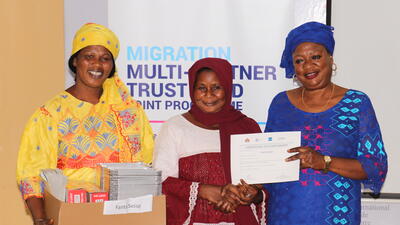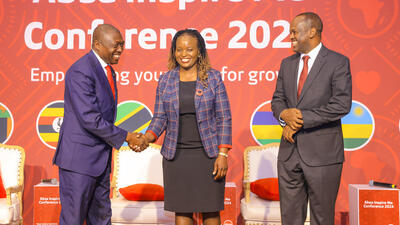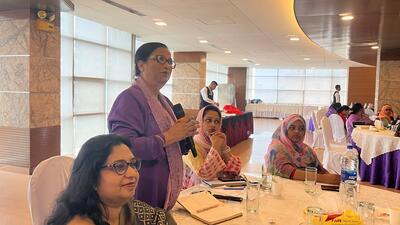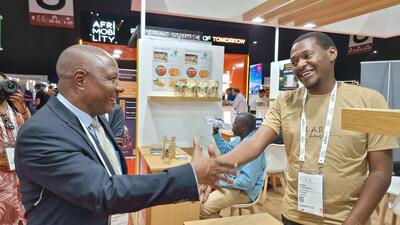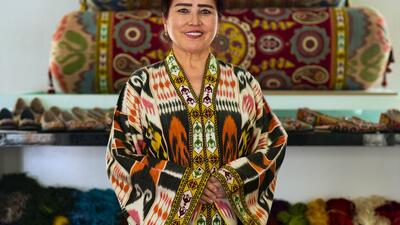Rocking more than the cradle: Women in the Malaysian economy
It was a passionate message by the Malaysian prime minister, welcomed after so many years of toil: ‘If we look at the progress we have made in Malaysia, there is no denying that a large part of it has been achieved thanks to the women of this country.’ Prime Minister Najib Razak wrote this in his 1Malaysia blog, marking International Women’s Day in March. Indeed, women in Malaysia have made great progress in contributing to nation building. From educational achievements to involvement in politics, community services and social and economic development, their participation has often made the difference, with women taking leadership in some of these areas.
Based on the Census of Establishment and Enterprises by the Department of Statistics, women’s participation in the Malaysian labour force reached 46.1% in 2010, compared to 15% in 2005. The 2011 Grant Thornton International Business Report revealed that Malaysia, with 31% of senior corporate positions in the country occupied by women, ranked 7th among the 39 countries it surveyed. Among the members of the Association of Southeast Asian Nations, Malaysia was only outranked by the Philippines and Thailand, which have 35% and 45% of their senior posts held by women, respectively.
Women at the centre of development policy
Recognizing the challenges faced by women in business, the Malaysian government has put in place various initiatives to empower women in business. Entrepreneurship has in fact been identified as one of the pathways for women to contribute to the economic transformation of the country. The government has therefore created several funding strategies for businesses set up by women:
• Microcredit loans to women entrepreneurs: over 38,000 women have received such financing, amounting to US$ 35 million to date, or 44% of the total amount disbursed from the Entrepreneur Economic Fund;
• Soft loans under the Rural Economy Financing Scheme to help rural entrepreneurs start or upgrade their business, following the Grameen Bank model: from 2006 to 2009, 565 women entrepreneurs benefited from this scheme;
• Funds from the Women Franchise Programme to promote entrepreneurship through franchising.
Malaysia’s economic development plans specifically aim to assist women in reaching their potential. This includes encouraging more women to participate in the labour force, increasing the number of women in decision-making positions, and providing training and re-skilling opportunities through the national Human Resource Development Fund. In June 2011, the government established a policy to encourage the private sector to increase the number of women on corporate boards and in top management positions to at least 30% by 2016.
The government also encourages qualified women to achieve top positions in the civil service. A special committee, chaired by the Minister of Women, Family and Community Development, was established to implement gender sensitization programmes in the public sector with regard to recruitment, career development and succession planning — increasing the prevalence of women in key decision-making positions within the parliament, state legislative assemblies, the judiciary and ministries.
In business, records show that women have typically been identified with services activities (teaching, nursing), light manufacturing (textiles and clothing, fashion, cosmetics, arts and handicrafts, jewellery) and agro-processing (food products, herbal-based products). The situation is gradually changing, with more women-owned or women-operated companies participating in programmes to develop new business opportunities, many in sectors previously dominated by men. These include chemicals, building materials, automotive parts and components, electrical and electronic products, and oil and gas.
Increasingly, women entrepreneurs have also been actively involved in exporting professional services such as engineering, architecture and surveying, as well as business support services including logistics, laboratory testing services, marketing and consultancies.
Increasing the ranks of women exporters
Recognizing that ‘the hand that rocks the cradle’ has potential to excel in international business, the Malaysia External Trade Development Corporation (MATRADE) introduced a special programme in 2005 to assist women exporters: the Women Exporters Development Programme. This programme targets entrepreneurs who are keen to expand beyond Malaysia's borders, and aims to improve their knowledge of international markets. Through its network of 42 offices worldwide, MATRADE helps these women network with buyers and partners abroad to secure export opportunities, and also provides mentoring and advisory services. Since its inception, the programme has succeeded in grooming women entrepreneurs from a wide range of sectors to become sustainable exporters.
Today, more than 3,200 women-owned or women-managed companies have registered as exporters with MATRADE. Most women business owners have no qualms about participating in international trade promotion events, whether the markets are traditional or new and unfamiliar. These women have developed true business acumen and may possess greater knowledge of trade matters than their male counterparts.
MATRADE continues to focus on skills development and international marketing — facets of trade that currently keep many women entrepreneurs from reaping the full benefits of international business, including access to markets, financing, leadership skills and capacity building.








